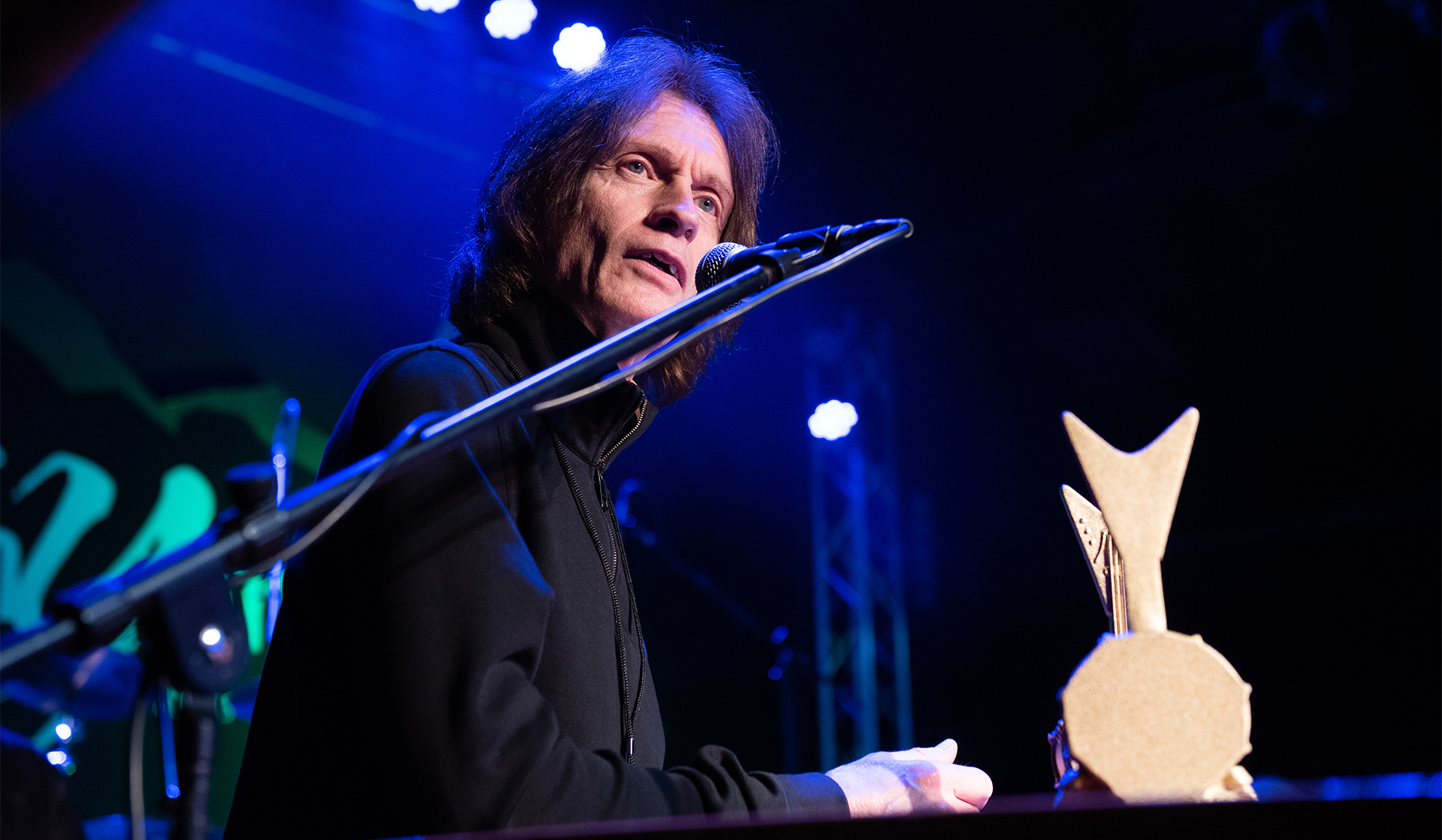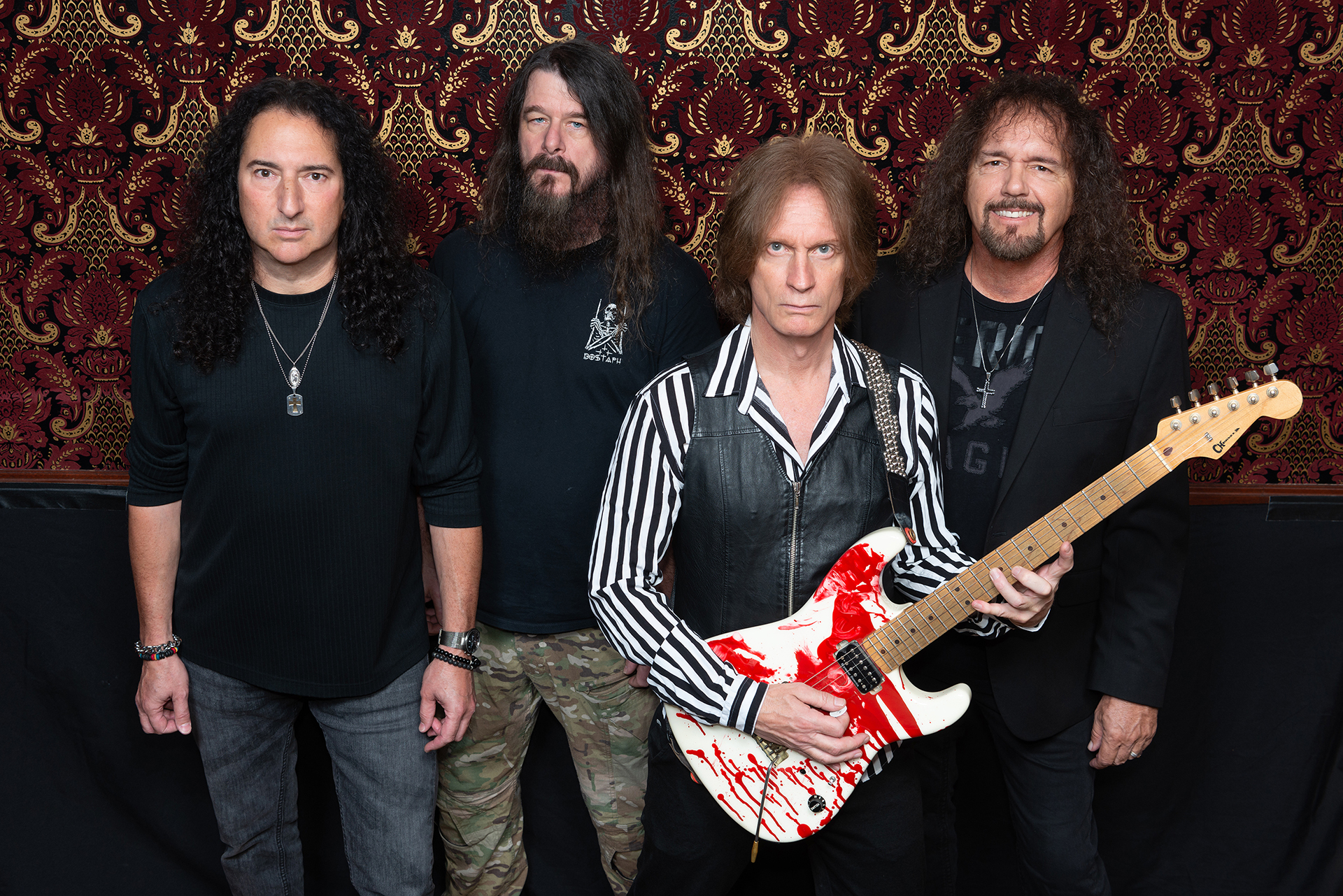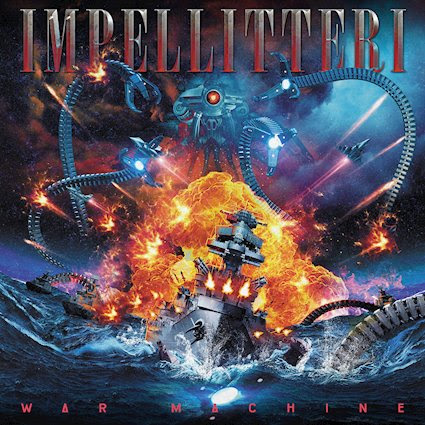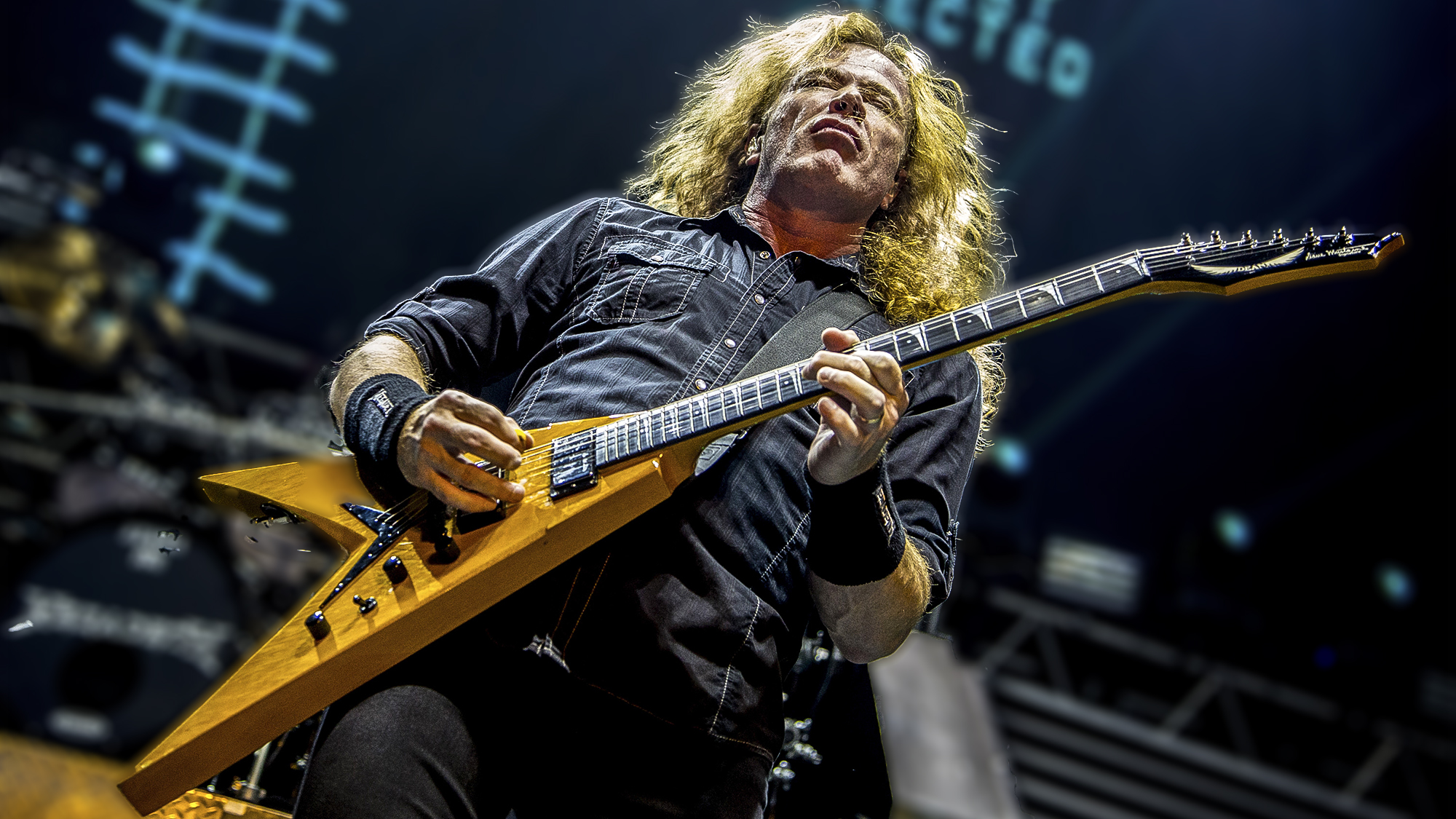“When she died, she was literally the last person I had in my life. I fell apart. I didn't care anymore.” Chris Impellitteri nearly gave up when tragedies took his family. Guitar kept him alive
As his band drops its new album, 'War Machine,' the shredder explains how life's highs and lows have shaped him as a player

When Chris Impellitteri looks back on his career's rise, fall and rebound, he refers to it as "a resurrection."
Indeed, Impellitteri arrived on a high, bursting onto the scene in 1987 with a shock and awe generally reserved for Yngwie Malmsteen and Eddie Van Halen.
The reason was obvious: Impellitteri had speed-demon fingers, the likes of which had never been seen. His hyper-fast, hyper-technical soloing was all over his eponymous band’s self-titled debut EP.
"I got a lot of attention for it,” he tells Guitar Player. “And sometimes that overshadowed the band. It's been a constant tug of war trying to bring the real fans back into focus that the band's not just me."
Impellitteri's struggles weren't restricted to his guitar playing. At the age of nine, his parents committed suicide, leaving him to be raised by his grandmother. In the late ’80s, she succumbed to cancer, sending the up-and-coming guitarist into a years-long tailspin the affected his playing and led his critics to attack him..
"It's almost like I was trying to self-sabotage," Impellitteri admits. "That's the way the doctors described to me later in life. They said, 'Chris, your behavior was highly suicidal. You were trying to destroy yourself.' I went through two or three years of that, and believe me, the people who hated me initially just pounced on that. They used it against me. People called me a 'masturbating guitar player.'"
What helped pull him back was the response to Stand in Line, the group’s first full-length record. “There was a blessing in that,” he says. While the album performed well in the U.S. — it reached 91 on the Billboard 200 and remained on the chart for 20 weeks — Impellitteri found a more enduring, and rabid, audience for his lightning-fast chops overseas. “We became monstrous in Japan," he says. "And eventually, I regained my musical creativity and control and started playing really well again."
All the latest guitar news, interviews, lessons, reviews, deals and more, direct to your inbox!
While he might have been short on inspiration — and, at times, love from critics — Chris Impellitteri never stopped making music. His namesake band dropped 11 records through 2018, and the band's latest, War Machine, is number 12.
"Even if you're playing power or speed metal, it can still have a good melody."
— Chris Impellitteri
Reflecting on how his choppy journey has impacted his guitar playing, Impellitteri says, "I've gotten to a place where I've improved my knowledge of music theory and application. That's a nice way of saying once you learn all the modes and scales, it's about applying it in a melodic sense.
"Even if you're playing power or speed metal, it can still have a good melody," he adds. "As a guitar player, I'm incorporating everything that I've learned over the years — and I've learned a lot from other players. With everything I've absorbed, I'm doing a much better job than in the past of articulating and expressing all that in our music.”

Every time you put out a record, the focus is always on how fast you can play. But there's got to be more to what you do, right?
There's a major misconception about my guitar playing. I'm flattered and humbled when I get compared to Yngwie and Paul Gilbert, but the reality is that Impellitteri is a band. It's never solely been about me as a solo artist.The goal was always to mix Judas Priest or Iron Maiden with some classical music, like Beethoven.
Did that goal get lost in the shuffle of the '80s shred era?
Yes. A lot of the attention was focused on "How fast can Chris play?" versus listening to the band, which has always been a metal band.
You were afforded cult success as a band with Stand in Line, your first album with Graham Bonnet. And it was very different from the first, self-titled EP
" 'Stand in Line' was almost like a blessing and a curse because we deviated from what we wanted to do."
— Chris Impellitteri
The EP was the foundation of who we were. We didn't have a lot of money; we pretty much went into a studio, put up a couple of nice room mics, and played live. It was more like Maiden or Priest on steroids. That was the goal.
But when our singer, Rob Rock, quit, I had gotten a record deal and had a responsibility to put a new singer in the band. Graham and I were friends. I knew him from Rainbow and Alcatrazz, so he was pretty well known. We had a meeting and decided, "Let's do music more in the direction of that era of Rainbow," which was the polar opposite of the direction I'd done with Rob on the first EP.
How do you look back on Stand in Line?
It's almost like a blessing and a curse because we deviated from what we wanted to do. We thought we couldn't write power or speed metal with Graham's voice, so we went with what he was more known for. But because we got a lot of attention for that record, it a lot of people who got into us had a misconception of what the band was supposed to sound like.
We had a ton of success in Japan, but even with all those cool things happening, the record wasn't a true Impellitteri record. That's the funniest thing to me: the stuff before and after Stand in Line doesn't sound like Stand in Line.
So what makes War Machine a true Impellitteri record guitar-wise?
You can immediately tell that we're a metal band, one that’s inspired by Ozzy and even Randy Rhoads at times. And maybe even stuff like Pantera and Helloween. When you hear this music, you immediately realize that this isn't Chris Impellitteri, the solo guitar player; this is four guys contributing to the music. We're a metal band. That's what the band has always been. We've just never had a voice.
The media over here never really raised us up. In Japan, I'd be on the cover of magazines constantly, but in the U.S., they kind of turned their back on us.
Why do you think that is?
There's a case of Dr. Jekyll and Mr. Hyde when you're dealing with me. When I first came onto the scene in Connecticut, I quickly built up a cult following. People really liked my guitar playing, I started getting covered in guitar mags, and there was a good foundation there because I was playing really well. I was taking lessons, studying music theory, and expressing myself in a way that was healthy and positive.
"I couldn't speak because I was terrified. So they got me into guitar. The guitar became something I could use to express myself."
— Chris Impellitteri
But when my grandmother died, I fell apart. When I was nine years old, my mother and father committed suicide, and my grandparents adopted me, thank God. They loved me, but I couldn't speak because I was terrified. So they got me into guitar. The guitar became something I could use to express myself. It gave me an outlet and a purpose.
And then my grandmother was diagnosed with cancer. She was literally the last person I had in my life. I started going to doctors and taking medications. Right after the first Impellitteri EP — as we got into the Stand in Line era, for about three and a half years — I fell apart. I didn't care anymore
How did that lack of care impact your guitar playing?
I was playing recklessly. I was trying to appease the gods, which were record labels, and the people who expected me to play fast. I became a mess, literally. I was reckless and sloppy — I just didn't care. I didn't really want to live, to be honest. I was going through the motions.

You managed to work your way out of that. Would you be here without the guitar?
To me, the guitar has been a voice. If you look at any kid that goes through something like I did, there's going to be trauma. The guitar was my comfort blanket; I couldn't speak, but I could play guitar. So the instrument, in many ways, saved my life.
War Machine shows us that your trademark speed remains intact. What are some of the benefits that speed has on your fretting and picking accuracy?
When I’ve been competent and in a good state of mind — meaning playing well and not drugged out of my mind — I’ve always been very disciplined. I’ve always sat down and played with a metronome and worked on articulation. And for me, everything had to be picked. I now realize all these years later that that was really dumb.
"For me, everything had to be picked. I now realize all these years later that that was really dumb."
— Chris Impellitteri
Why is that?
Because I set rules that I think really restricted my ability. But I’ve changed, and the way I play today is quite a bit different from the beginning. I realized the power and beauty of legato. There are times when you want to make sure everything is consecutively picked alternately, where it's down, up, down, up, down, up. But there are a lot of times when legato phasing has a subtly beauty — especially when there's melody, no matter how fast you're playing.
What other techniques have you worked on?
I work on my articulation, and I'm always working on alternate picking. But today, more so in the past, I constantly work on my legato. I'll listen to stuff from Allan Holdsworth, Al Di Meola and John McLaughlin for inspiration. I'll play along with that stuff just to see if I can play in that same kind of manner and with that kind of accuracy.
You've been playing Charvel guitars lately. What else did you use on War Machine?
My main guitars are a vintage Charvel that Grover Jackson and Mike Shannon hand-built. I can't explain it, but it's amazing. It's a classic Charvel from the late ’70s, so there's no Floyd Rose, and it has a vintage Strat-like tremolo.
The only thing that's different from a traditional Strat is that it has a 12-inch flat radius all the way; it's not compound. It's got an original '59 PAF in the neck and bridge, and instead of 22 frets, there are 21, which most people hate. But I use that guitar a lot.
Then, I've got my favorite Fender Strat, which is a '71, the last year with four bolts. And I've been using a couple of these 1975 Gibson Flying Vs, which play amazingly. When you sit down with a Flying V, you think, Oh, this is going to be uncomfortable as hell. But as soon as you sit down and put the wedge over your left or right knee, it's the most comfortable guitar you could ever imagine playing.

It's interesting that you like the '70s Gibsons so much. A lot of people loathe the Norlin era. Is the shade thrown at that era of guitars way unfair?
Good question. I've had many vintage guitars, and there's this misconception that just because you have a '59 Les Paul, they're the greatest guitars since sliced bread. That's just not true. It's like one out of 10. It’s like the old Marshall heads: one out of 10 sounds really good, and the other nine are crappy.
So for Gibson, if you talk about '75, that period of time, I know what you mean. But for some reason, the Flying Vs they just got right. Same with the ’79 models — I believe Kirk Hammett has one of those; that's his main V. Maybe it's the neck shape or the scale length, but those guitars just sound really good.
After all the trials and tribulations you've been through in your career, what keeps you in that good place you mentioned earlier?
I think I just fell back in love with the guitar. I find myself picking up the guitar all day long and just constantly. I have guitars in every room: upstairs, downstairs — whatever. I have guitars everywhere. I just really love playing.
Andrew Daly is an iced-coffee-addicted, oddball Telecaster-playing, alfredo pasta-loving journalist from Long Island, NY, who, in addition to being a contributing writer for Guitar World, scribes for Rock Candy, Bass Player, Total Guitar, and Classic Rock History. Andrew has interviewed favorites like Ace Frehley, Johnny Marr, Vito Bratta, Bruce Kulick, Joe Perry, Brad Whitford, Rich Robinson, and Paul Stanley, while his all-time favorite (rhythm player), Keith Richards, continues to elude him.


